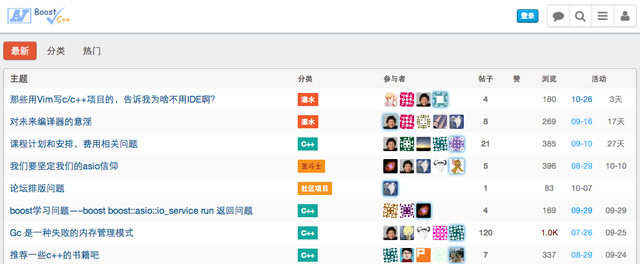One thing I’m really proud of is that when we launched Discourse, we had first class Internationalization (i18n) support ready to be used. Our first release only English, but thanks to our community we have 18 localizations of our software in progress! Here’s what Discourse looks like in Simplified Chinese:

On the server side, Discourse uses Rails’ built in i18n support. It has been around for a long time and works easily so I won’t go into that. Check out the documentation for your server side framework of choice for more.
I18n in Ember.js
Our client side application is written in Ember.js, which doesn’t have built in support for i18n. However, it’s not difficult to add it in.
We use i18n-js, a project whose goal is to bring Rails translation support to Javascript. Don’t worry if you don’t use Rails on the server side. You can use all of the code in this post outside of Rails if you like. The Javascript code in 1i8n-js is all you’ll need.
Once you’ve included i18n-js in your project, you will have access to an I18n object in your javascript code to perform
translations with. The first thing you’ll need to do is include a translations.js file that includes all your translations. Here’s
how a simple one could look:
I18n.translations = {
en: {
hello: 'hello',
cookieCount: {
one: 'You have {{count}} cookie.',
other: 'You have {{count}} cookies. Yum!'
}
},
fr: {
hello: 'bonjour'
cookieCount: {
one: 'Vous avez {{count}} biscuit.',
other: 'Vous avez {{count}} biscuits. Le Yum!'
}
}
};
And then if you wanted to output a translation you can use the i18n.t function:
console.log(I18n.t('hello')); // outputs hello because the default locale is `en`
I18n.locale = 'fr';
console.log(I18n.t('hello')); // outputs bonjour
In an Ember app though, you’ll want to be able to access those translations in your handlebars templates. To do this, you’ll need to define a helper. You can just copy and paste this code into your app:
Ember.Handlebars.registerHelper('i18n', function(property, options) {
var params = options.hash,
self = this;
// Support variable interpolation for our string
Object.keys(params).forEach(function (key) {
params[key] = Em.Handlebars.get(self, params[key], options);
});
return I18n.t(property, params);
});
Now your templates are ready to be translated:
<h1>{{i18n hello}}</h1>
<p>{{i18n cookieCount count=user.cookies.length}}</p>
Note that the I18n library is smart enough to notice when you supply a parameter named count to select the correct
pluralization for a key. If the user has one cookie it won’t add that pesky “s.”
I18n support is so easy to add that I recommend it for just about every web project unless you’re absolutely sure you’ll never need it in another language. The Internet is a lot bigger than your home country, go forth and make it easier to translate!